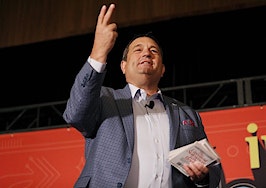Craig McClelland spends more than $430,000 a month on the staff at his Atlanta brokerage.
That’s twice as much as McClelland — the vice president and chief operating officer at Better Homes and Gardens Real Estate Metro Brokers — spends per month on facilities, but he said Tuesday during a an Inman Connect Las Vegas panel entitled “Hire, Fire, Evolve: Rethinking the Way Your Brokerage Staff is Structured” that the expense is worth it.

Craig McClelland
“We build a foundation, a structure, that agents build their business on top of,” McClelland explained to a packed crowd.
McClelland, along with Hunter Rowe Real Estate owner Mike Regan, both discussed their efforts to build brokerages that “departmentalized” — a word Regan used. The idea is that dividing up different roles frees up everyone’s time, and allows people to focus on the things that matter most to them.
Of course, many real estate companies have staff members who aren’t commission-based agents and who tend to logistical issues. But what McClelland and Regan have built is something a bit different. They were, in essence, describing the benefits of having a substantial team of salaried or hourly specialists.
In McCelland’s case, his brokerage employs 175 different staff members, who support more than 2,000 agents working across 27 offices in the Atlanta area. Some of those staffers work as recruiters. Others spend their time in the financial department. But in all, having people specialize in different tasks allows McClelland’s company to respond “quickly and very nimbly” to changes in the market, he said.
That’s especially important in Atlanta, McClelland added, because his market is currently an epicenter for industry disruptions — for example from various iBuying companies.
In Regan’s case, he employs 24 client service managers, who he described as “full time agents who are ready made teams for these top producers.”

Mike Regan
“It’s a different structure that works great for our top producers,” he added.
This “different structure” offers something of a twist on the increasingly popular strategy of building a team. In the more common version of this approach, a top producing agent often brings others under his or her wing in a relationship that is meant to benefit everyone involved.
But the scenario that Regan and McClelland outlined tasks the brokerage itself with the organizational and managerial aspects of team building. The result is a group of specialists who serve multiple agents and, ideally, the ability to take advantage of an economy of scale that distributes burdens across many people.
Going down this path wasn’t easy for Regan. For example, the budget for his full-time staffers comes from commissions that brokers earn, meaning that there was something of a logistical nightmare just to get it to work.
“When the brokers have closings we get reimbursed,” Regan added. “It took years to get it straight.”
But eventually it did work, and one of the other benefits Regan discovered along the way was that not everyone in real estate wants to be out there buying, selling and living by commission.
“I think there are people who want to sell and take risks,” Regan said. “There’s other people who just want the security.”
McClelland observed a similar phenomenon at his company.
“I find that I have a lot of individuals in roles that aren’t sales minded,” he explained. “So they don’t really think, ‘Hey, I can get to the bonus.’ They’re really just trying to pay their mortgage and car payment. It’s something that’s steady and really pays their bills.”
And both McClelland and Regan agreed that harnessing the skills of those people has been a boon to their brokerages.
McClelland also ultimately offered a number of tips for real estate firms wanting to try this departmentalized approach. Those tips included regularly reviewing staff members’ performance and allowing people to evolve into different roles.
“The number one thing you need them to have,” he added, “is the skill set of a problem solver.”









